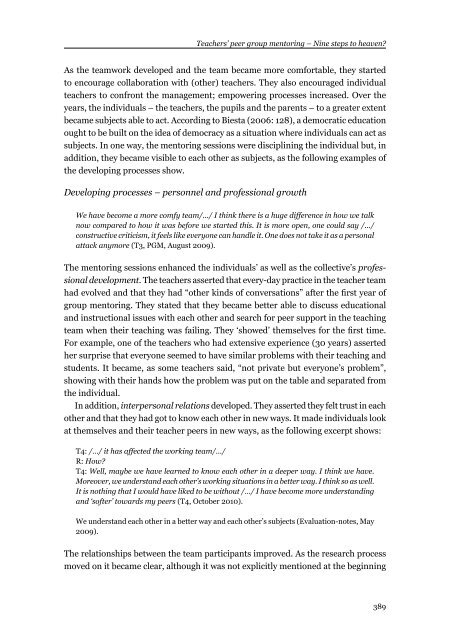Download issue - Umeå universitet
Download issue - Umeå universitet
Download issue - Umeå universitet
You also want an ePaper? Increase the reach of your titles
YUMPU automatically turns print PDFs into web optimized ePapers that Google loves.
Teachers’ peer group mentoring – Nine steps to heaven?<br />
As the teamwork developed and the team became more comfortable, they started<br />
to encourage collaboration with (other) teachers. They also encouraged individual<br />
teachers to confront the management; empowering processes increased. Over the<br />
years, the individuals – the teachers, the pupils and the parents – to a greater extent<br />
became subjects able to act. According to Biesta (2006: 128), a democratic education<br />
ought to be built on the idea of democracy as a situation where individuals can act as<br />
subjects. In one way, the mentoring sessions were disciplining the individual but, in<br />
addition, they became visible to each other as subjects, as the following examples of<br />
the developing processes show.<br />
Developing processes – personnel and professional growth<br />
We have become a more comfy team/.../ I think there is a huge difference in how we talk<br />
now compared to how it was before we started this. It is more open, one could say /.../<br />
constructive criticism, it feels like everyone can handle it. One does not take it as a personal<br />
attack anymore (T3, PGM, August 2009).<br />
The mentoring sessions enhanced the individuals’ as well as the collective’s professional<br />
development. The teachers asserted that every-day practice in the teacher team<br />
had evolved and that they had “other kinds of conversations” after the first year of<br />
group mentoring. They stated that they became better able to discuss educational<br />
and instructional <strong>issue</strong>s with each other and search for peer support in the teaching<br />
team when their teaching was failing. They ‘showed’ themselves for the first time.<br />
For example, one of the teachers who had extensive experience (30 years) asserted<br />
her surprise that everyone seemed to have similar problems with their teaching and<br />
students. It became, as some teachers said, “not private but everyone’s problem”,<br />
showing with their hands how the problem was put on the table and separated from<br />
the individual.<br />
In addition, interpersonal relations developed. They asserted they felt trust in each<br />
other and that they had got to know each other in new ways. It made individuals look<br />
at themselves and their teacher peers in new ways, as the following excerpt shows:<br />
T4: /…/ it has affected the working team/…/<br />
R: How?<br />
T4: Well, maybe we have learned to know each other in a deeper way. I think we have.<br />
Moreover, we understand each other’s working situations in a better way. I think so as well.<br />
It is nothing that I would have liked to be without /…/ I have become more understanding<br />
and ‘softer’ towards my peers (T4, October 2010).<br />
We understand each other in a better way and each other’s subjects (Evaluation-notes, May<br />
2009).<br />
The relationships between the team participants improved. As the research process<br />
moved on it became clear, although it was not explicitly mentioned at the beginning<br />
389

















